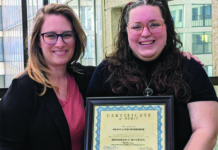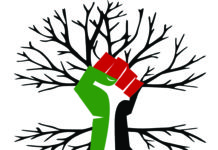Ian Thomas is a senior majoring in Environmental Science and minoring in Political Science and is the President of CMU’s Sustainability Council. Thomas is a big advocate for the environment and social justice.
“The issue I care most about is definitely climate change because it affects the very survivability of humanity on this planet and it also connects to social justice, how our economies operate, so it really touches every aspect of our lives,” Thomas said.
“I got into environmentalism as a kid, I lived a quarter mile away from this massive open space, so I could just go wander around in the woods whenever. I really got connected to nature that way and as I started to learn more, I took an AP Environmental Science class in high school and that’s really where I got my start.”
Thomas has led, organized and attended rallies centered around climate change, stating that he noticed a pattern of environmental destruction and could not ignore it.
“Civilizations before us, they’ve collapsed before when they misuse their soil resources, when they’ve overfished their [rivers], whenever they use the resources they have in an unsustainable manner, then that renders their society unsustainable,” Thomas said.

Elias Born for The Criterion
When asked about how environmentalism relates to the left, he stated that it has been over-politicized and conservatives, especially recently, have been “not allowed” to care about the environment.
“It also ties into a lot of other progressive issues, like social justice because environmental justice really is social justice at its core. When you look at […] [Los Angeles], the poorest sections in L.A. are the sections that are closest to oil refineries and natural gas drilling and exploration so those poor areas, they have to deal with the pollution and all of the negative side effects that come with climate degrading activities,” Thomas said.
Thomas personally would have liked to see Bernie Sanders make it further, but conceded that he could see the appeal of Joe Biden as a more moderate candidate.
“My support is 100 percent behind [Biden]. I think he’s also willing to listen to some of his more progressive supporters as well as his conservative supporters because he’s not going to be elected as the Democratic President, he’s the President of the United States, and that includes Republicans and Democrats. From what I know of him, I think he’ll be very supportive of all sides,” Thomas said.
Thomas has also been to Black Lives Matter protests, three in Grand Junction, and two in Colorado Springs. He stated that before George Floyd’s murder came to light, he had not confronted his place in society. “I make videos and I take a lot of pictures as well, so I’ve been trying to use my skills to amplify the voices of others, especially the voices that have been suppressed for far too long,” Thomas said.
Thomas also talked about “The Social Dilemma” on Netflix, which is a movie about how social media is a big influence on us, especially in politics.
“[It’s] feeding this political tribalism that is increasingly polarizing our society. I’m 21 years old and I’ve seen in the last 10 years […] the polarization is ridiculous in this country. I encourage people to watch that film, and if they don’t want to watch that film, find someone across the aisle and have a conversation,” Thomas said.
He encourages others to talk to others on the opposite side of the spectrum and look at where agreement happens, so it builds from there and tensions about politics can start to decrease.






